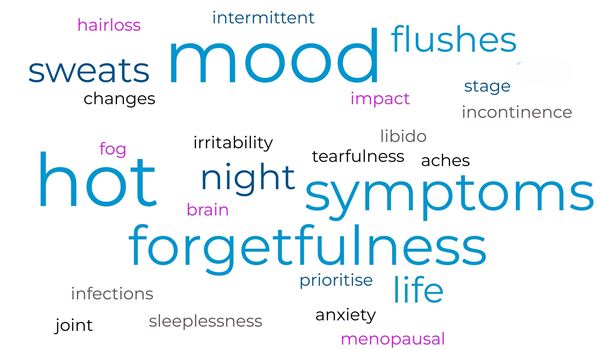Menopause
Menopause is a natural part of aging, typically occurring between 45 and 55, as oestrogen levels decrease. In the UK, the average age for reaching menopause is 51.
The stage leading up to menopause, called perimenopause, often lasts several years.
You are thought to be “post-menopausal” when you have had a year since your last period. (But you are only able to know this if you are not on any hormones or contraception that may affect your periods). Determining your exact stage may be challenging; however, we prioritise your symptoms and how they’re affecting your life over the specific stage.

Symptoms may include some or all of the below and can be intermittent initially
- Hot flushes / Night sweats
- Skin dryness/ crawling sensation
- Anxiety
- Joint aches
- Mood changes / Irritability / Tearfulness
- Poor or no libido / Vaginal dryness
- Forgetfulness / Poor sleep
- Urine infections / Urinary incontinence
- Brain fog
- Hair loss
If menopausal symptoms are impacting your daily life, remember that you’re not alone, and there are many supportive resources available to help you feel your best. From educational materials and community groups to personalized medical treatments, there are ways to manage and even alleviate many symptoms of menopause.
Exploring these options can offer relief, help you feel more in control, and empower you to navigate this stage with confidence.
Scroll down to learn more.
Considering HRT (Hormone Replacement Therapy)
The main medicine treatment for menopause and perimenopause symptoms is hormone replacement therapy (HRT), which replaces the hormones that are at low levels.
If menopausal symptoms are impacting your life and you believe HRT could help after reading this leaflet, please take the following steps:
1. Contact us to make an appointment to discuss HRT.
2. Prepare Health Information to bring with you:
- Recent blood pressure reading from a home device, pharmacy, or GP surgery.
- Your current weight.
Menopause is generally diagnosed based on symptoms alone, and blood tests are rarely necessary.
You can also find information about HRT for menopause symptoms, including the types of HRT, benefits and risks and how to take it on the NHS website by following this link>>
Page created: 13 April 2023

